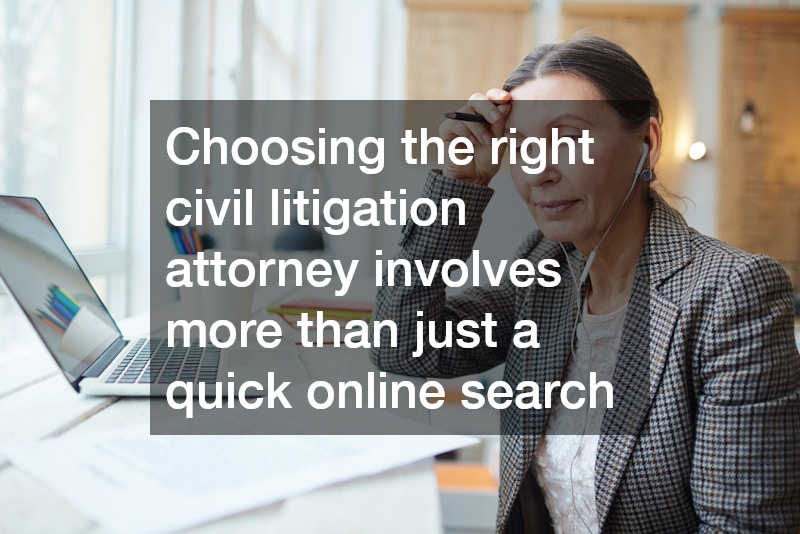
Civil litigation encompasses a wide range of legal disputes, usually involving individuals or organizations seeking monetary damages or specific performance. Unlike criminal law, civil litigation focuses on resolving issues such as contract disputes, property matters, and personal injury claims. It is essential to understand that civil litigation is adversarial, meaning that both sides present their cases before a judge or jury who then decide the outcome based on the evidence presented.
When considering hiring a civil law lawyer, familiarize yourself with the different stages of civil litigation. Generally, these include pleading, discovery, trial, and potentially appeals.
Each stage demands a comprehensive strategy and careful preparation, factors that underscore the importance of securing seasoned legal representation.
Moreover, understanding your potential lawyer’s role in each phase can significantly enhance your legal proceedings. A civil law lawyer will guide you through complex legal jargon and navigate the procedural intricacies inherent in litigation. Their expertise ensures that your case is presented effectively, maximizing the likelihood of a favorable verdict.
Qualities to Look for in a Civil Litigation Attorney
Choosing the right civil litigation attorney involves more than just a quick online search. There are specific qualities you should prioritize to ensure effective and competent representation. Firstly, look for someone with substantial experience in civil law, as this will not only reflect their expertise but also their ability to handle similar cases successfully in the past.
Another critical quality is a strong communicative ability. A civil litigation attorney should be adept at breaking down complex legal concepts into understandable terms, while also being an excellent negotiator. This skill is crucial as it facilitates smoother interactions with opposing counsel and can make a significant difference during settlement discussions or court presentations.
Reputation and reliability are also paramount when selecting your lawyer. Check reviews, ask for referrals, and meet the attorney for a consultation to gauge their professionalism and dedication. A reputable lawyer will maintain transparency about your case’s strengths and weaknesses, setting realistic expectations from the onset.
Cost Considerations and Legal Fees
Before engaging a civil litigation attorney, understanding the potential costs involved is crucial. Legal fees can vary widely depending on the attorney’s experience, the complexity of your case, and the jurisdiction. Attorneys typically charge either a flat fee, by the hour, or on a contingency basis, where they only get paid if you win the case.
It’s advisable to discuss the fee structure upfront to avoid any surprises later on. Ensure that the attorney provides a comprehensive breakdown of potential expenses, including court fees, administrative costs, and charges for additional services like depositions or expert witnesses. Transparency in financial matters ensures that you can budget effectively for your legal journey.
Additionally, consider the value that a seasoned civil law lawyer brings to your case. While hiring a highly experienced attorney might come at a higher cost, their expertise can often lead to faster resolutions and potentially higher settlements, balancing out initial expenses. Therefore, weigh the financial aspects against the potential outcomes to make an informed decision.
The Importance of Initial Consultation
One of the first steps when considering a civil litigation attorney is to schedule an initial consultation. This meeting provides a platform for both parties to assess compatibility and discuss the particulars of the case. It’s an opportunity to ask questions, share your concerns, and gauge the attorney’s level of interest and enthusiasm about your case.
During the consultation, observe how attentively the attorney listens and responds to your queries. This engagement level may serve as a predictor of how they will approach your case. Prepare specific questions related to their experience, strategy, and previous case successes to ensure that their expertise aligns with your needs.
The consultation also provides a glimpse into their professionalism, organizational skills, and how they might represent you in formal settings. It’s crucial to leave this meeting feeling confident in their capability to handle your case effectively. Remember, your civil litigation attorney will play a pivotal role throughout the legal process, so establishing a trust-based relationship early on is essential.
Ultimately, choosing a civil litigation attorney requires careful consideration and informed decision-making. Armed with an understanding of civil litigation complexities, qualities to look for, and potential costs, you are better positioned to select a legal representative that meets your requirements. Employing due diligence during your selection process can profoundly impact the trajectory and outcome of your case.
Your civil law lawyer will serve as your advocate and advisor, navigating the intricate legal landscape on your behalf. Therefore, prioritizing experience, communication, and reliability when making your selection ensures that your interests remain protected. An informed attorney-client relationship is the cornerstone of effective legal representation, paving the way for successful civil litigation.
In closing, while the task of hiring a civil litigation attorney might seem daunting, the right approach ensures you make a choice that aligns with your legal needs. By thoroughly evaluating potential candidates and understanding what each brings to the table, you set the stage for a favorable legal journey. Remember, the right lawyer will not only offer expertise but also empower you throughout your litigation process.

